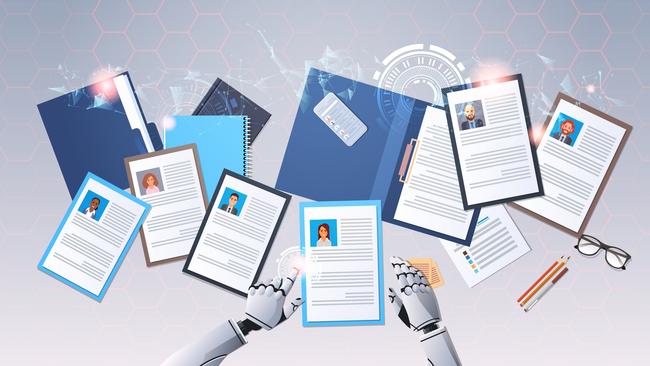AI jobs ads shrinking in Australia, new data reveals
Competition for jobs in artificial intelligence has grown fierce as more than 1000 advertised roles have disappeared from jobs boards over the past two years, a fall of 35 per cent.

Advertisements for artificial intelligence-related roles are shrinking in Australia, new job data reveals, with the number of roles down 35 per cent compared to when ChatGPT first launched more than two years ago.
AI job ads have shrunk from more than 3750 in 2022 to 2440 in 2024, now representing just 0.5 per cent of all job ads.
The fall in AI-related roles arrives as many Australian companies are having second thoughts about the technology, with many failing to see a return on their investment.
It could also suggest a lower turnover as employees hold on to existing jobs.
AI has been hailed as the technology that will transform business productivity, and the world’s biggest tech companies are devoting billions of dollars towards product development as they race to gain market share.
But in Australia, new data suggests a different picture, with the number of available roles shrinking and several companies openly commenting that investment in the technology is yet to pay off.
Martin Herbst, the chief executive of the firm behind the data, JobAdder, said not only had AI roles shrunk, the number of candidates had boomed.
“Recruiters are no longer struggling to find candidates – they’re inundated with them,” he said.

“The real challenge now is filtering through the high volume of applications to identify the most skilled and qualified candidates.
“This task has become even more daunting as recruitment teams have shrunk, and the pressure to streamline workflows has intensified.”
The rise in applicants could be likened to title inflation, with many workers assuming they might be able to increase their salary by adding AI to their resume.
Fiona Chan, the partner at specialist tech recruitment firm Lookahead, said that was a growing issue when it came to finding AI talent.
“Many apply for roles with no relevant skills or experience, or apply for multiple, totally different roles. This makes us focus on headhunting and database search over advertising,” she said.
The rise of digital jobs boards that let applicants apply for a role in seconds had also made it easier for the wrong talent to blast their resume out, she said.
The new data could indicate that companies have discovered not every business requires in-house AI experts and that some benefits of the technology are accessible via third-party vendors.
It could also indicate that companies were content with the first wave of AI experts hired and did not see a need to hire further employees with AI skills.
JobAdder’s data paints a slight contrast to all the AI hype the world has seen and heard over the past two years.
But there are other factors that may have affected the number of AI-related roles being advertised.
Several months after ChatGPT’s public launch, The Australian reported that tech workers with AI skills could command as much as 20 per cent premium for their skills.
Recruitment Consulting and Staff Association chief executive Charles Cameron said at the time that staff with AI skills were considered “unicorns” and companies were forking out heavy sums to get their hands on top talent.
RCSA predicted that companies would also increase the salaries of staff with AI skills to keep them happy and ensure they didn’t jump ship.
“At the moment these people are seen as ‘unicorns’; they are a rare find and are being well compensated for it,” he said.
But Gartner experts shared a less optimistic view, believing that many companies would still be working out the best way to get benefits out of AI before they could consider replacing staff with it.
Data reported this week would suggest that’s still the case, with a number of companies saying they’re yet to get a return on their investment in AI.
About 58 per cent of companies who had invested in programs and applications told a Cisco survey the technology had fallen short of expectations.
Cisco chief technology officer Carl Solder said about 44 per cent of companies saw no improvement or not enough from AI in automating their businesses.
“I think the reality is that they started to appreciate the work and effort involved in getting all those building blocks squared away, and the strategy, infrastructure data governance, talent and culture,” he said.
Despite this, a number of companies still feel pressure to invest in the technology, intending to allocate 10-30 per cent of their IT budget to AI.
AI jobs grew significantly, rising 258 per cent in the five years leading to ChatGPT’s launch in November 2022.
Advertised AI jobs are back down to 2018 levels, sitting at about 0.5 per cent of advertised jobs in the Australian market.
Findings from JobAdder’s soon-to-be-released market report suggest candidate oversupply surged by more than 200 per cent in some cases.
About 53 per cent of recruiters have reported a rapid rise in the number of candidates for jobs, while 47 per cent of recruiters said there was a decline in hiring rates at most organisations.
Data from Employment Hero’s latest SmartMatch report found tech industry employee growth was up 2.9 per cent overall, and the median hourly wage was now $59.70, up 6.3 per cent year-on-year.






To join the conversation, please log in. Don't have an account? Register
Join the conversation, you are commenting as Logout